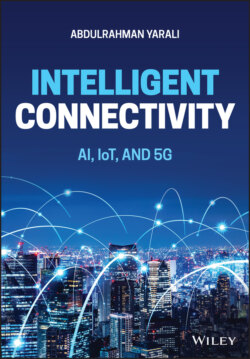Читать книгу Intelligent Connectivity - Abdulrahman Yarali - Страница 23
1.4.1 Intelligent Interfaces
ОглавлениеIn the current technological advancements, the intelligent interface enables communication between two or more entities. The system's intelligence aspect means that the interface can predict what the user wants to do; thus, the system can predict the actions of the mind (Yasar 2019). Due to their technological advances, intelligent interfaces can be helpful while undertaking specific tasks. The intelligence factor enables the system to use the information gathered appropriately. In today's world, individuals have embraced technology, and they interact with it through various intelligent services, and the trend is expected to get better in the future. The presence of intelligent services has enabled people to move from traditional keyboards to touchscreens, while others use voice commands and other upcoming technologies. Therefore, businesses are expected to experience extreme growth from technology advancements since user interfaces will enable people to undertake various procedures more simply. A change in the engagement patterns provides a seamless and natural interaction method (Arxiv 2019).
In the next two decades, the business tech will experience advancements in innovative voice capabilities, which will allow communication with multifunctional systems in natural and active conversations. Since intelligent interfaces are integrated with systems based on AI, they can reply to various non‐verbal commands (Yasar 2019). The current interfaces can combine some of the latest human‐centered design techniques with some leading telecommunication technologies. Some of these technologies include computer vision, conversational voices, and auditory analytics, and some also consider the use of virtual reality. It is expected that these interfaces will become too complex and inflexible, while some people argue that some of the interfaces may not change when people's needs change (Arxiv 2019). In some instances, the interfaces do not work with each other. In the business world, an interface is intelligent if it can adapt to different users' needs and learn different concepts and techniques. An interface is also intelligent if it can anticipate the user's needs and initiate and provide different user suggestions (Hazard and Singh 2016). It is also intelligent if it can explain various actions that it may undertake.
Business‐related intelligent interfaces have a specific architecture that determines their functionalities. They have a particular rule that governs their performance; they have frame descriptions and contain discrimination networks; they also contain sub‐Sumption hierarchies and an inference engine. Other essential entities of the architecture include associative memory, matching, and the presence of autonomous agents. Intelligent interfaces are built with a perspective of human–computer interaction; the interfaces aimed at promoting businesses are designed so that they are clearer and have increased efficiency. Information is presented effectively and they offer better support while undertaking various tasks and goals (Hazard and Singh 2016). In the next two decades, intelligent interfaces will undergo a considerable transformation, making business technology better and easier. The presence of these interfaces is to offer services to the buyer and then provide the buyer with another buying opportunity. It is designed to benefit them in various areas, such as tracking the customer's habits while offline, providing new products and solution sets, and creating real‐time context‐aware and automated feedback loops based on the customer's feedback (Yasar 2019). The technology aims to make business interaction better and increase the revenues of the organizations.
Therefore, it is expected that more designs will be implemented, which will transform businesses around the globe. The system is meant to enhance efficiency, bandwidth capabilities, and cloud‐edge computing to ensure the services are rendered at an optimum rate (Arxiv 2019). Intelligent interfaces are meant to enhance the functionality of the system and make the user's experience better. The future of technology is still open, and it is expected that complex systems will be developed and will transform the entire business industry. Organizations need to choose the ideal intelligent systems that will suit their objectives and goals. Even though there might be challenges during their implementation, there is a need to equip employees with skills to adapt to changes and support their implementation. In the next two decades, failure to adapt to change will cost many organizations because they will not be able to analyze and implement changes in the business sector (Hazard and Singh 2016).
